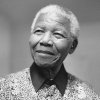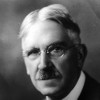“ it is only a knowledge that others prize unselfishness as an excellence, and esteem him in the degree in which he exhibits it. ”
John Dewey, Democracy and Education (1916). copy citation
| Author | John Dewey |
|---|---|
| Source | Democracy and Education |
| Topic | unselfishness self-esteem |
| Date | 1916 |
| Language | English |
| Reference | |
| Note | |
| Weblink | http://www.gutenberg.org/files/852/852-h/852-h.htm |
Context
“Without this vital appreciation, the duty and virtue of unselfishness impressed upon him by others as a standard remains purely a matter of symbols which he cannot adequately translate into realities. His "knowledge" is second-handed; it is only a knowledge that others prize unselfishness as an excellence, and esteem him in the degree in which he exhibits it. Thus there grows up a split between a person's professed standards and his actual ones. A person may be aware of the results of this struggle between his inclinations and his theoretical opinions; he suffers from the conflict between doing what is really dear to him and what he has learned will win the approval of others.”
source


